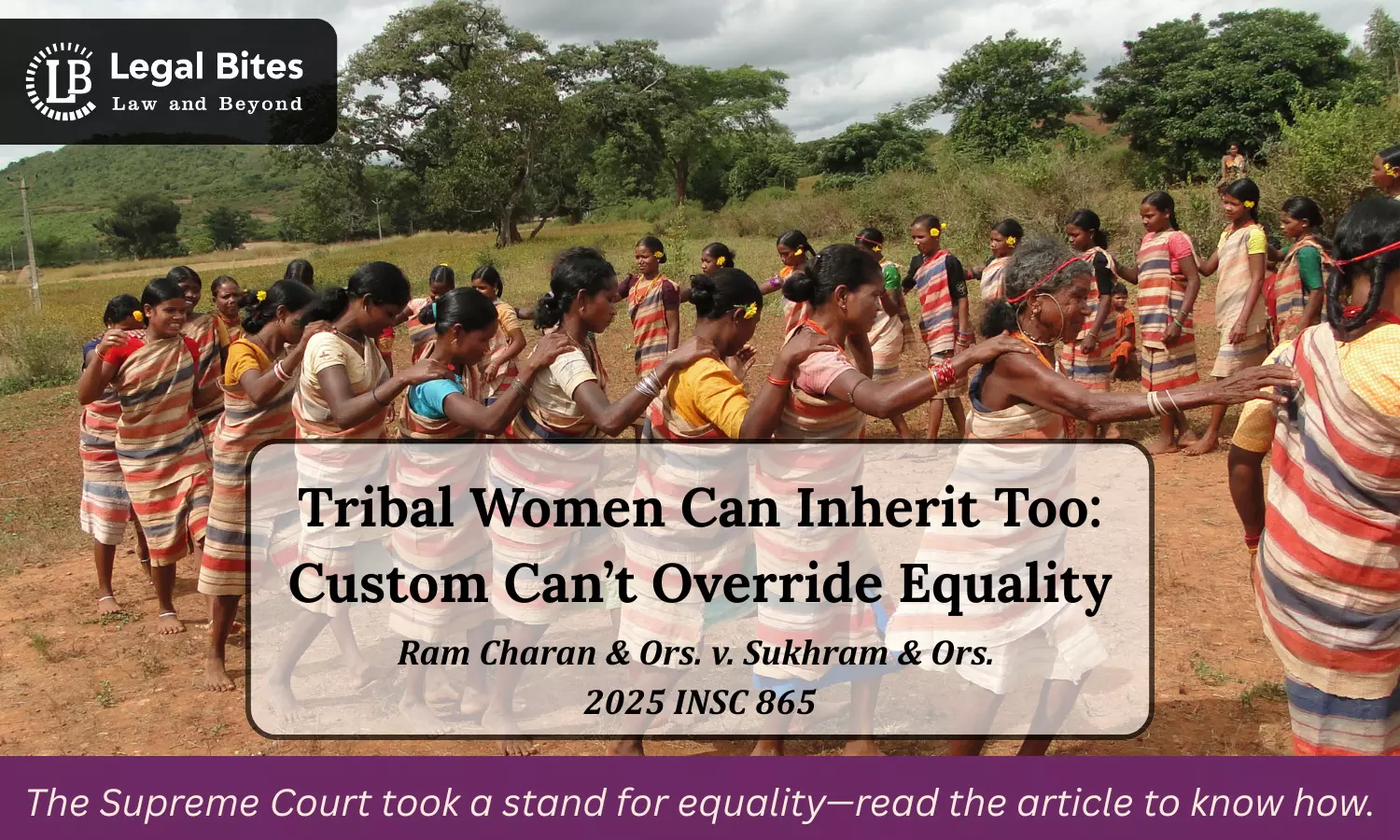Can Tribal Women Be Denied Equal Inheritance Rights? What Did the Supreme Court Say?
Tribal women cannot be denied inheritance rights solely due to custom, rules Supreme Court—gender equality must prevail over tradition.

The recent Supreme Court judgment in Ram Charan & Ors. v. Sukhram & Ors. (2025 INSC 865) has reignited a significant legal and constitutional debate: Can tribal women be denied equal inheritance rights solely based on customary norms? This landmark decision addressed a long-standing issue of gender inequality in succession laws applicable to Scheduled Tribes in India.
Through this article, we delve into the background of the case, the arguments presented, and the Supreme Court’s ruling that reinforces the constitutional guarantee of equality, particularly for women belonging to tribal communities.
Background of the Case
The legal dispute arose from a suit for partition filed by the appellants—legal heirs of Dhaiya, a tribal woman who was one of the six children (five sons and one daughter) of Bhajju alias Bhanjan Gond, a tribal man. The appellants sought a declaration and partition of their maternal grandfather’s property, asserting that Dhaiya, as his daughter, was entitled to an equal share.
Their claim was denied by both the trial court and the first appellate court. The courts concluded that no credible evidence had been produced to establish a tribal custom that would permit female heirs to inherit ancestral property. Additionally, they observed that since the Hindu Succession Act, 1956, does not apply to Scheduled Tribes [Section 2(2)], the appellants could not rely on it for their claim.
Issue
Whether a tribal woman (or her legal heirs) is entitled to an equal share in her ancestral property in the absence of any established custom recognising such a right.
Findings of the Courts
Trial Court's Decision (2008):
- The trial court dismissed the suit, holding that the plaintiffs failed to prove any customary right of succession through female heirs among the Gond tribe.
- It emphasised that the Hindu Succession Act does not govern Scheduled Tribes, and in the absence of specific customary law supporting inheritance rights for women, the claim could not be sustained.
First Appellate Court's Decision (2009):
- Concurred with the trial court’s view, adding that there was no evidence to support the contention that children of a female heir were entitled to a share in the property.
High Court Decision (2022):
- The Chhattisgarh High Court dismissed the second appeal on the ground that the findings of the lower courts were not perverse.
- It rejected the argument for applying principles of justice, equity, and good conscience based on a coordinate bench decision in Daduram v. Bhuri Bai.
- Crucially, it erred in holding that the Central Provinces Laws Act, 1875—which permitted application of justice, equity, and good conscience in the absence of custom—was repealed and therefore inapplicable.
Supreme Court’s Verdict
A Bench comprising Justices Sanjay Karol and Joymalya Bagchi delivered the judgment on 17 July 2025, setting aside the lower court rulings and allowing the appeal.
Key Observations
1) Incorrect Assumption by Lower Courts:
- The courts below assumed that a custom excluding women from inheritance existed and expected the plaintiffs to prove otherwise.
- The Supreme Court clarified that in the absence of an established custom either excluding or including women, courts should have relied on principles of justice, equity, and good conscience.
2) Hindu Succession Act Inapplicable:
- The Court reaffirmed that Section 2(2) of the Hindu Succession Act excludes Scheduled Tribes unless a notification by the Central Government is issued. Hence, the claim could not be based on the 2005 amendment that made daughters coparceners.
3) Revival of the 1875 Act Principles:
- The Supreme Court corrected the High Court's misunderstanding about the repeal of the Central Provinces Laws Act, 1875.
- Citing the saving clause under the Repealing and Amending Act, 2018, the Court emphasised that accrued rights and the application of “justice, equity, and good conscience” remained intact for disputes arising before the repeal.
4) Customs Cannot Be Frozen in Time:
- The Court warned against allowing patriarchal customs to dictate legal rights when such customs are ambiguous, unproven, or discriminatory.
- It noted that customs, like laws, must evolve with time and cannot be used to perpetuate inequality.
5) Violation of Article 14 – Equality Before Law:
- Denying inheritance rights to a woman solely due to her gender violates Article 14 of the Constitution.
- The Court also relied on Article 15(1), which prohibits discrimination based on sex, and Articles 38 and 46, which direct the State to promote social justice and economic equality for weaker sections, including women and Scheduled Tribes.
Principles of Justice, Equity, and Good Conscience
The Court cited several precedents emphasising that when no statute or custom applies, courts must rely on equitable principles to deliver justice:
- Niemla Textile Finishing Mills Ltd. v. 2nd Punjab Tribunal (1957): Justice must prevail where the law is silent.
- M. Siddiq v. Suresh Das (Ram Janmabhoomi case): Equity supplements statutory interpretation.
- Tirith Kumar v. Daduram (2024 SCC OnLine SC 3810): Applied the principle to uphold the property rights of tribal female heirs.
The Court reiterated that these principles are not discretionary but form part of the judicial mandate to prevent arbitrariness and injustice.
Constitutional Morality Over Social Tradition
In a powerful assertion, the judgment stated that:
“Customs, too, like the law, cannot remain stuck in time, and others cannot be allowed to take refuge in customs or hide behind them to deprive others of their right.”
It also underscored that while positive customs can be codified into law, discriminatory or unproven customs cannot override constitutional guarantees.
Key Highlights of the Decision
Sanjay Karol, J. and Joymalya Bagchi, J. stated:
"..... We are of the view that, unless otherwise prescribed in law, denying the female heir a right in the property only exacerbates gender division and discrimination, which the law should ensure to weed out.
.... We are of the firm view that in keeping with the principles of justice, equity and good conscience, read along with the overarching effect of Article 14 of the Constitution, the appellant-plaintiffs, being Dhaiya’s legal heirs, are entitled to their equal share in the property. The judgments of the Courts below are accordingly set aside to that extent. The civil appeal is allowed accordingly."
Implications of the Judgment
- Precedent for Tribal Women's Rights: This ruling sets a clear precedent that tribal women cannot be denied inheritance on the vague premise of custom unless a valid, specific, and non-discriminatory custom is established.
- Boost to Gender Equality: It harmonises personal law with constitutional equality, pushing forward gender justice in tribal communities historically governed by patriarchal norms.
- Affirmation of Judicial Role in Filling Legal Gaps: By invoking equitable principles, the Court reinforced its role in ensuring justice even when statutes or customs fall short.
Conclusion
The Supreme Court’s judgment in Ram Charan v. Sukhram is a watershed moment in tribal jurisprudence, reinforcing the idea that the right to equality is not contingent on the codification of laws or rigid customs. In a society striving for inclusiveness, denying women their rightful share in ancestral property—especially under the garb of custom—is not just unconstitutional, it is unjust.
By prioritising justice, equity, and good conscience, the Court has made it clear that discrimination cannot hide behind tradition. Tribal women, like all Indian citizens, are entitled to the full measure of rights guaranteed under the Constitution, including the right to inherit property equally.

